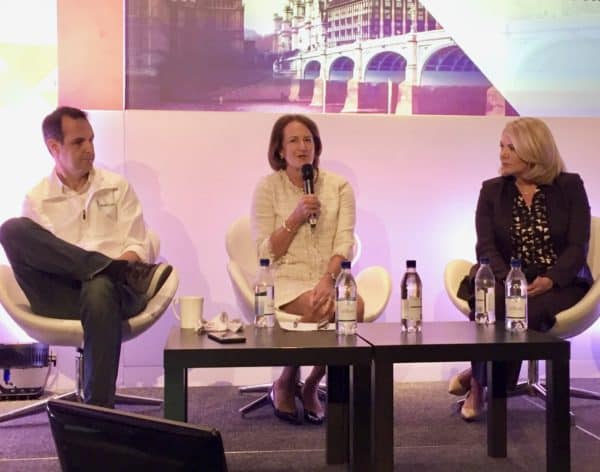
Several years back while at LendIt Europe in London, I had the opportunity to sit down with Karen Mills a Senior Fellow at the Harvard Business School Harvard. Mills previously was a Cabinet Member during the Obama Administration from 2009 to 2013. At that time, she was the head of the US Small Business Administration, a federal agency with a mission to preserve free competitive enterprise and to maintain and strengthen the overall economy of our nation. The economy was still mired in the aftershocks of the Great Recession and it was a crucial moment for the country and the compelling need to support small businesses. Her experiences in government led her to publish a white paper entitled “The State of Small Business Lending: Credit Access during the Recovery and How Technology May Change the Game“. The document remains a must read treatise on what policy makers got wrong during the recovery regarding access to capital for SMEs.
In brief, Bank lending has historically been critical for small businesses to thrive. But transaction costs for a traditional bank loan to SMEs are effectively the same at $1 million as for $100,000. So which loan will a bank prefer? The one that is more profitable for them, obviously, so the small borrower inevitably gets pushed aside. And as one may expect, there are far more SMEs that are looking for loans below $100,000.
 Access to credit became a problem for SMEs during the recession and ensuing recovery. And as we all know, SMEs are the engines of economic growth and job creation. The conundrum is that banks were being asked to shore up their balance sheets and shoulder less risk, a policy push that inevitably made the recovery more difficult as this restricted access to SME loans. Businesses needed credit they simply could not get and this extended the pain of the recession.
Access to credit became a problem for SMEs during the recession and ensuing recovery. And as we all know, SMEs are the engines of economic growth and job creation. The conundrum is that banks were being asked to shore up their balance sheets and shoulder less risk, a policy push that inevitably made the recovery more difficult as this restricted access to SME loans. Businesses needed credit they simply could not get and this extended the pain of the recession.
But these challenges for SMEs to obtain credit created an opportunity for alternative lenders to fill the finance gap. In a world of unintended consequences, innovators stepped in to provide access to credit when the banks turned their backs. Hopefully this lesson has been learned, and policy makers have a better understanding as what they should, or should not do, to boost an economic recovery during a future recession.
Mills believes that online lending has the potential to reduce the cost of borrowing at every stage while providing a better experience for the borrowers. But will online lending remain the purview of disruptive Fintechs? This is an important question to ask.
So Jump forward a couple of years and, once again, I had a chance to sit down with Mills at LendIt Europe 2017.
As always, Mills perspective was enlightening. She shared some predictions about online lending while explaining the phases of Fintech disruption. Today, Mills believes we are somewhere between Phase 2 and Phase 3. These Phases are described as follows:
Phase 1: The Wild West and the Emergence of the Innovators
Fintechs burst on the scene with marketplace (P2P) lending. These early platform become niche players.
Phase 2: The Banks Wake Up
The dinosaurs figure out they have some assets they can use rousted from their slumber by Fintechs. Banks Invite the innovators in but instead of partnerships, a much greater percentage build their own platforms (think Goldman Sachs’ Marcus). Customer service is where the innovation takes place. Waiting for 3 months just to hear no does not work well – online this process can be much simpler and faster. They can build a better front end to provide a superior lending experience.
Phase 3: The platforms arrive: Alibaba. Amazon. Square etc.
Big tech like Facebook, Google, Apple, PayPal, Amazon etc will become significant players in the next 12 to 18 months. They have so much data available to them to provide an efficient and effective lending process.
Phase 4: Small Business Lending Utopia
All businesses have access to the credit they need to grow and thrive.
Obviously, we are not yet in the land of Lending Utopia but the good news for business is we are getting closer.

Mills is not simply a Fintech cheerleader but more of a pragmatist. She believes that the ability of Fintechs to bring new sources into the credit decision has not yet been delivered. But when you look at big tech like Amazon, you see a platform that knows everything about sellers. That is actionable information. And it is not just Amazon. It is Facebook. It is Apple. It is Google and more. Big tech has intelligence it can use to help businesses grow. Extrapolate that concept across the marketplace and you may have something very powerful.
“If you know everything a customer has purchased … How much they exercised … Where they were before (IE location). You understand your customer better. That is like gold.”
“They know everything about you and they can turn that into something that is helpful for the small business,” said Mills
 Mills believes big tech may dominate lending but the question is what form and with what products. But this is where regulation comes in. There could be an intervention and, of course, old finance will try and fight back.
Mills believes big tech may dominate lending but the question is what form and with what products. But this is where regulation comes in. There could be an intervention and, of course, old finance will try and fight back.
“Congress is stuck,” explained Mills. “So it is very hard to tee up a bill on Financial Services regulatory reform. They need to get some other things done first. There is still some uncertainty as to what they are lobbying for and whose ox is going to get gored. Banks still wonder if financial innovation is good. If they are going to compete, they don’t want Fintech to have a lower cost of regulation.”
Spaghetti Soup with too many overlapping regulators
There is a lot of discussion right now regarding excessive regulation in general and the possibility that Fintechs may have an advantage. The current administration has halted much new regulation but change can take some time. The OCC Fintech Charter, a vehicle that could provide a path for Fintechs to operate nationally, has been criticized by traditional finance and various members of Congress. Mills believes the Fintech Charter could be a good thing that is beneficial for the country. There is currently too much regulatory confusion and overlapping federal agencies, but she also believes you need disclosure laws that apply to business lending that maintains transparency and a level playing field.
“This situation will intensify. The future will bring new and powerful competitors into the game,” stated Mills. “Incumbents are resisting. They are fully regulated now. They are not happy about that burden. They do not want to see new competitors that have an advantage.”
 Mills believes we should be able to solve this problem if we focus on the public good. But that can be a pretty big IF.
Mills believes we should be able to solve this problem if we focus on the public good. But that can be a pretty big IF.
“If we believe that SMEs are important to the economy, we want to be certain we have many options to provide credit. The Fintechs woke up the banks. That was good for competition and good for the small business customer,” added Mills.
Jeff Bezos. Online Banker.
Mills does not believe small community banks should be penalized in the process and a Fintech Charter that does not disadvantage banks is doable. The question is will the political climate allow for a national charter for Fintechs, or perhaps Big tech, to evolve? That’s a tough question. Mills believe it is not a question of it, but when. It’s inevitable.
And what does Mills believe when you have innovative finance on one side and traditional on the other?
“Anything that gets us closer to small business lending Utopia is a good thing. We need to work to that end,” stated Mills


